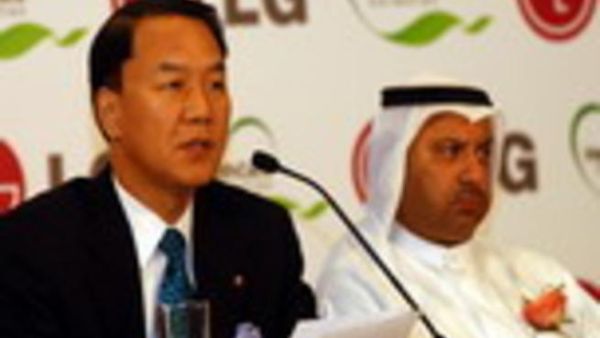Almost one in three people in the GCC have experienced some health problems linked to allergies, with respiratory ailments ranging on top, with dust in the region and poor air quality in homes and offices identified as the leading risk factors, a comprehensive study conducted across select markets in the Middle East and Africa has found.
The research, conducted in the UAE, Saudi Arabia, Iran and South Africa by well-known research company Synovate, on behalf of global and digital leader LG Electronics, found that only four in 10 people exercised and have regular check-ups.
Launched in 2006, the LG-Synovate survey was aimed at understanding consumers’ health concerns. More than 1,000 people participated in the survey across the region; 252 from the United Arab Emirates (UAE), 255 from the Saudi Arabia (KSA), 262 in Iran and 256 in South Africa.
More than 90 per cent of participants stated that health was one of their biggest concerns today, and that they have experienced more health-related problems over the past 12 months. Diseases related to respiratory, skin and nutrition were rated as most common across the region.
The results were announced at a press conference held in Dubai April 16, 2007, to launch LG’s latest Healthcare Collection, a sophisticated range of digital appliances designed to provide optimum hygiene in homes and offices. Respondents included doctors, healthcare officials and residents and were in the 25-45 age group.
“At LG we undertake a great deal of research into what is most important to our customers and we found that people in the Middle East and Africa are very concerned about living healthy lives,” explained Mr. K. W. Kim, President of LG Electronics – Middle East and Africa. “Our new products are based on the insights and ideas that we get from our thorough research on the market.”
LG is introducing its full health-friendly product line, including air conditioners, refrigerators, washing machines, light wave ovens, vacuum cleaners and air purifiers. The company was the first to begin focusing on the health-focused products, and has created a completely unique market for the home appliance industry. The product line will be available across the Middle East and Africa from May.
In the LG-Synovate research, health issues topped the list of concerns among residents and varied in the markets. For example, the UAE saw a very high general level of health interest, with 97 per cent being concerned about health and 50 per cent placing health concerns above lifestyle, job satisfaction and personal finance.
The survey indicated that respiratory, skin and nutrition-related diseases have had their highest incidence during the past year. Most people declared themselves concerned with respiratory, skin and nutrition-related diseases in the past 12 months.
In the UAE, among the respondents those who suffered health problems in the past 12 months, allergies were the leading incidence, followed by respiratory and nutrition problems. In Saudi Arabia, respiratory is the leading problem, followed by allergies. Nutrition was ranked fifth.
Respiratory disease is the largest concern in South Africa, with allergy third and nutrition fifth, while in Iran, respiratory disease comes up first in terms of incidence, followed by allergies, with nutrition ranking sixth.
Respondents blamed dust (67 per cent) and air pollution (59 per cent) as the main reasons for respiratory problems in the region. Other factors blamed for were irregular maintenance of appliances, including mould in air-conditioners in cars as well as homes, high temperatures, long hours in traffic, poor nutrition and cigarette smoking.
Despite claimed high concern on health (majority being concerned about their health to a high degree – 4.55 out of 5) and despite medical professionals pointing to an encouraging number of positive healthcare initiatives launched by the government, reality shows that people’s behaviour is still lagging behind when it comes to actually taking measures to look after their health.
A majority of UAE respondents admitted that continue to include high levels of sugar, fried food and red meat in their daily diets, though study showed that eight in 10 people declare themselves more health-conscious now then they were in the past.
“The LG-Synovate study provides an important insight into new illnesses in the region that can be attributed to modern lifestyles and conditions in the GCC,” explained Adelina Mustata, Client Services Director at Synovate. “This comprehensive study suggests high rates of respiratory problems in a large number of respondents, not only among construction workers but also residents across the region.”
Incidences of respiratory illnesses and breathing difficulties are increasing in the region despite growing awareness about their causes and implementation of preventive measures. In Saudi Arabia for example, bronchial asthma (50 per cent) and acute bronchitis (25 per cent) figured as the top respiratory illnesses, according to KSA doctors’ estimation.
Pointing to the increasing importance of such scientific research in product development, Mr. K. W. Kim, President of LG Electronics – Middle East and Africa, said: “We devote a considerable amount of time interacting with the scientific community worldwide to understand what our consumers seek and examine ways to innovate products to make a difference to their lives.”
The development of the LG Healthcare Collection was a prime example of research playing a crucial role in product creation, Kim said. “The goal of the LG-Synovate exercise was to learn the extent of environmental and health aspects that affect people, with regional relevance,” he added.
Results of interviews with both general population and doctors in Saudi Arabia show high propensity to believe that technology can help to prevent problems in the areas of nutrition (58 per cent), respiratory problems (55 per cent), and skin problems (46 per cent). UAE respondents showed a greater acceptance of technology, with 74 per cent confirming that scientific innovation can help to keep health problems away.
Most of the respiratory problems are caused by poor air quality in the homes and dangerous levels of pollution in the cities. The incidence of these respiratory illnesses varies and were unpredictable in timing and magnitude. Fresh air (37 per cent) and dust removal (25 per cent) in homes were listed as the two top improvements expected from technology in terms of respiratory- related healthcare.
The report also looks at the impact of respiratory illnesses on the community at large, GP practices, healthcare facilities in the GCC, and on mortality rates. The findings suggest the connection between the high prevalence of dust particles and numerous diseases that residents are reported to suffer.
About half of all the respondents firmly believed that technology could play an important role in minimising the risk factors associated with diseases. A majority said they were also keen to adopt new technologies that would dramatically improve hygiene in their environments and reduce illnesses resulting from unhealthy surroundings.
Doctors polled in the study recommended the use of proper maintenance of household appliances to maintain cleaner environments at home. Regular servicing of air-conditioners and maintenance of vacuum cleaners can dramatically improve air quality inside homes and offices.
These findings have implications for controlling other respiratory disease threats, Adelina added. “Homes and offices are the primary breeding grounds for respiratory and infectious diseases. The findings of the study will further help healthcare workers to implement effective control measures in such areas where people spend a majority of their lives,” she said.







